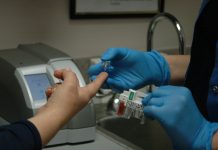
Each person is different. Typical low blood glucose symptoms are difficulty concentrating, weakness, feeling shaky or trembling, sweating (usually across the brow or under the bust), lack of coordination and lightheadedness or faintness.
Your brain and internal organs use your blood glucose for fuel. If there is insufficient fuel (glucose), your organs cannot function normally. That is why some persons who have low blood glucose pass out because there is not enough energy for the brain to function. The brain uses more glucose than any other organ in the body.
If you are not sure, use a blood glucose meter to quickly determine what your blood glucose is with a finger stick drop of blood. Otherwise, how would you know whether you need to eat 15 grams of carbohydrate (4 to 6 ounces of orange juice, milk or regular carbonated soda, 1 tablespoon honey or syrup or 6 saltine crackers) or take more medication (pills or insulin)? Eat 20 to 30 grams of carbohydrate if your blood glucose is less than 50 milligrams per deciliter, but only if you are conscious. This should raise your blood glucose 45 to 50 milligrams per deciliter. Test your blood glucose in 15 minutes and 60 minutes. If your blood glucose is still low, repeat with 15 grams carbohydrate. Use blood glucose readings to reinforce the physical symptoms that you are feeling. You should keep a record with the date, time and how you feel when your blood glucose is low. Have you discussed this with your doctor or dietitian?
Most persons will experience low blood glucose below 70 milligrams per deciliter. I know some people with type 1 diabetes though who find it difficult to tell if their blood glucose is high or low without testing with a blood glucose meter. You need to have a plan that defines when you need to take carbohydrate for low blood glucose and you should wear a bracelet that identifies you as having diabetes. Do you also know about glucagon shots or glucose tablets that you can take when your blood glucose is low? Ask your doctor about these.
After low blood glucose, you may feel sluggish for a while or no different. It just depends on the individual.


